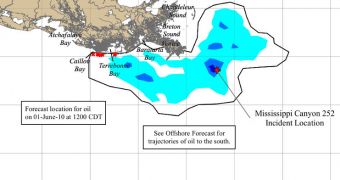Officials at British Petroleum, the company in charge of operating the former Deepwater Horizon semi-submersible drilling rig, announced that they were in the midst of devising a new plan to halt the oil leaks currently taking place in the Gulf of Mexico. The crude has been spewing into the waters for about six weeks now, and researchers estimate that more than 20 million gallons of the stuff have already contaminated the region. Thus far, multiple attempts by BP and the US federal government have failed in sealing the blown wellheads, but no one is giving up the fight just yet.
The new approach BP will take to cleaning its own mess is similar to a previous one that failed. The company plans to lower a large containment cap over the wellheads, in a bid to channel the oil flow to the surface, and into tankers. However, there is great risk associated with this plan. It calls for an underwater vehicle called a ROV to cut an oil pipe, which means that the flow of crude may increase at first. If the plan succeeds, then all would turn out for the best, but representatives from the company admit that they can provide no guarantees that the situation will be resolved.
It's more imperative now than ever to contain the spill, experts say. The hurricane season officially started today, June 1, and officials at the US National Oceanic and Atmospheric Administration (NOAA) say that high winds could wreak havoc in the oil slick. The crude may be pushed by high winds and strong tides at ever-increasing speeds towards the shorelines. While the Louisiana coasts have already been affected by the spill, the ones in Mississippi and Alabama have thus far evaded major damage. That could change within a few days, as NOAA is already forecasting winds that will take the oil to those locations later this week.
A couple of days ago, the White House energy adviser, Carol Browne, said that the oil spill was the worst ecological disaster in the history of the United States. The extent of the spill exceeded that caused by the Exxon Valdez oil tanker, which struck a reef in Alaska in 1989. A minimum of 10.8 million gallons of oil was spilled in the region, causing widespread devastation to wildlife and the ecosystem. Two decades later, NOAA estimates that around 26,000 gallons of the crude oil that spilled from the tanker still persist in the soil at the region. The new spill will most likely have even more severe consequences, due to the fact that the spill site is not contained naturally, between stretches of land.

 14 DAY TRIAL //
14 DAY TRIAL //